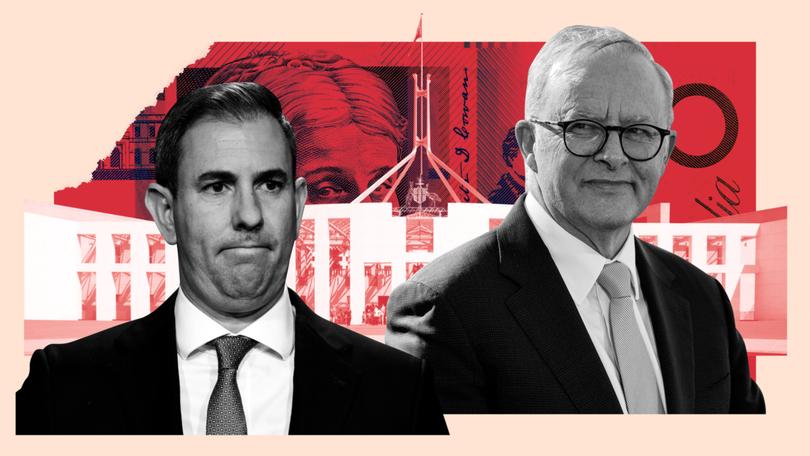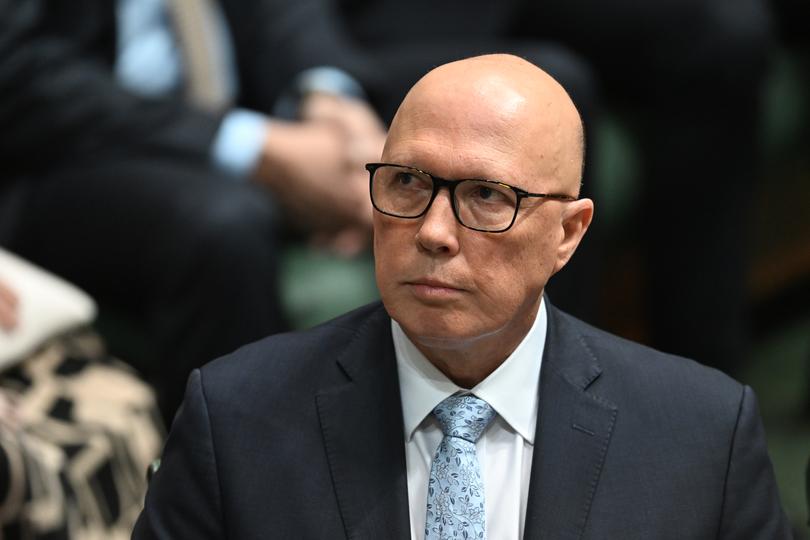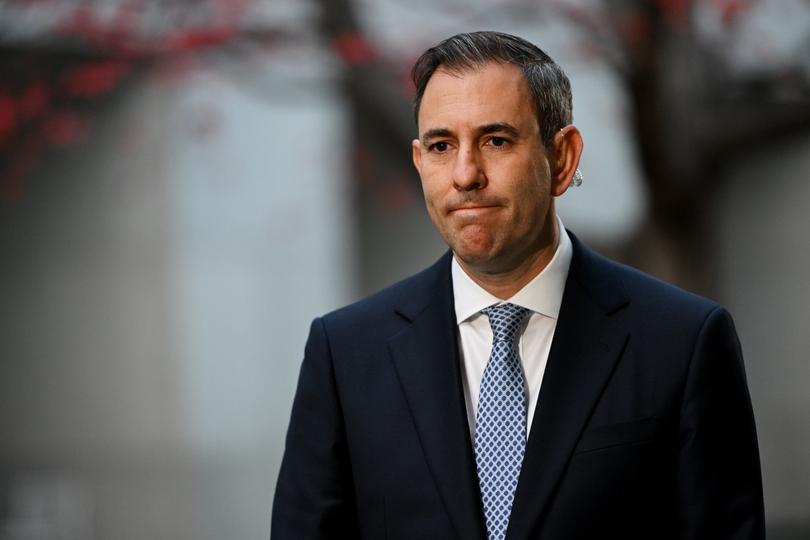PAUL MURRAY: Albanese and co’s tactics are transparent — they fail to deliver & pin the blame on everyone else
PAUL MURRAY: If Anthony Albanese were confident in his record in office, why does he spend so much time attacking Peter Dutton?

Here’s a question for those people who sit in the middle of the political divide, not partisan about their interest in the way the country is run.
They’re the ones who will decide the next Federal election, not rusted on to their voting preferences and willing to punish — or reward — on the basis of a government’s performance.
If Anthony Albanese were confident in his record in office, why does he spend so much time attacking Peter Dutton?
Sign up to The Nightly's newsletters.
Get the first look at the digital newspaper, curated daily stories and breaking headlines delivered to your inbox.
By continuing you agree to our Terms and Privacy Policy.Or is he automatically resorting to the tactic that got Labor over the line at the last election: to destroy his direct opponent with sustained personal vitriol?
That strategy supplants any obligation to offer better policies, while deflecting public attention from the failings of those Labor promised in 2021. Like lowering every Australian’s domestic power bill.
That $275 pledge falls due very soon. So far, family power bills have only dropped when Labor paid a part of them, using taxpayer funds to disguise the rapid rate of increase in the cost of electricity.
The $150 Commonwealth Energy Bill Relief paid in August didn’t reform the pressures forcing up the cost of electricity. It just temporarily papered over the cracks in Labor’s flawed renewables transition policy.
The $275 promise remains a mirage. And when the full $300 in Federal handouts are exhausted later this year, families will still face much higher power bills ahead than the day Labor came to power.
And they’ll remember that was the day Albanese also promised to implement the Uluru Statement “in full”.
Having messed up the referendum to enshrine the first part of the election-night commitment, the Indigenous Voice, he then cravenly reneged on the other two promised pillars of the statement’s ambitions.
And the smarter voters will realise that broken promise has become the enduring hallmark of his prime ministership: The road to nowhere.
The expression of good intentions and the now-familiar crab walking away from failure.
Another measure of Albanese’s spineless approach to leadership is the emerging tactic to defer the full version of Labor’s industry-sapping Nature Positive policy until after the election.
The current charade is getting the Greens onside. But the real plan is to hide the draconian nasties in the so-called “third tranche” of the proposed legislation — an overhaul of the environmental approval rules — before the polls. Voice mark 2.
Albanese knows West Australians understand how their bread is buttered and would vote against it if he showed his hand now.
So he’s been treating the electorate like idiots about Nature Positive. Which is pretty much all the PM did on his visit here this week.
The charm offensive couldn’t obliterate more than two years of lived experience of a Labor government which has failed to establish its authority. It too often operates like an Opposition, gormlessly pointing to the problems it was elected to fix.
After heading down to Collie, principally to headbutt Dutton again over his nuclear plans, the Prime Minister repeatedly referenced in media events the two big batteries the Cook Government is buying for $2.3 billion as it shuts down coal-fired power generation.
“I was there yesterday looking at the big battery that will be installed there to have storage of renewable energy,” he told 6PR’s Gary Adshead on Monday. “It will be able to store enough energy to power 860,000 homes.”

That sounds impressive, but what does it mean?
There are about 1.1 million residential properties plugged into the South West Interconnected System in WA. So anyone with solar panels on their roof feeding surplus energy into the SWIS could say they were “powering 1.1 million homes”. The electrons go everywhere.
That’s unless the listener was meant to understand that those homes would be powered “in full”. Because that would be a lie.
The reality of the Collie batteries is that they will hold enough energy when fully charged to theoretically power about 260,000 homes over four hours. And no longer.
However, that calculation is misleadingly based on the average household electricity consumption in WA, not the much higher demand during evening or morning peak hours when the batteries would be needed to avoid blackouts post-coal.
So the real number of residences getting emergency power from Collie’s batteries would be much less. The real figure, according to Synergy’s former head of generation, Mark Chatfield, is fewer than 170,000 homes.
Albanese got a leave pass on his 860,000 homes claim. But no one was asking him the even more obvious question: How will the Collie batteries be charged?
Excess rooftop solar? The sudden appearance of scores of new wind and solar farms? By the end of this year when the first battery is due to operate?
Even more pertinently, how will the batteries be recharged after being depleted during a blackout when the wind isn’t blowing enough and sun isn’t shining much at all?
Don’t even try to imagine those scenarios if the idiots demanding an immediate end to gas-fuelled power generation get their way.
Because, although Albanese specifically said the batteries — which have a lifespan of only 20 years — are to store renewable power, the truth is that they will be charged directly from the SWIS.
And that means most of the energy going into them before Net Zero 2050 will come from gas and the outgoing coal generators. There simply won’t be enough renewable power available.
Chatfield, who ran the Queensland Government’s giant CS Energy utility after leaving Synergy, says power from the expensive batteries will cost about $200/MWh compared to that coming directly from a gas generator at around $80/MWh.
“Batteries are a complete waste of money in the SWIS,” he says. “Their short-term contribution is minimal in the context of a SWIS load that has no solar input after sundown and minimal wind on a hot night.
“Simply building batteries to get the SWIS through these peaks is a recipe for blackouts and financial pain to consumers. It won’t work.”
Chatfield says Labor’s claims about the Synergy’s 500MW battery are “all smoke and mirrors”.
“Firstly, the battery is only rated for 2000MWh capacity, and can only be discharged to 10 per cent, so that represents 1800 MWh.
“The SWIS peak demand is over 4000 MW. The battery can only supply its 500MW for up to four hours, it can’t supply 1000 MW for two hours or 2000 MW for one hour, its electronics are not rated for that. It will melt!
“So the best it can do is 500MW for four hours maximum. That’s about 12 to 15 per cent of the SWIS peak demand.”
Which is a long way from “powering 860,000 homes”.
So much for the energy furphies.
The funniest thing I saw during a two-week break was Treasurer Jim Chalmers complaining in the House of Representatives about getting no questions on the cost-of-living crisis.
Asking Chalmers about that would be like seeking tips on personal hygiene from Typhoid Mary.
When his ferociously defended policies are clearly fuelling inflation and extending the crisis, why would anyone waste their time?
In his own mind, he’s reformed the Reserve Bank singled-handed, while remaking capitalism, but now finds the institution under his hand-picked leader, Michele Bullock, is “smashing” our economy.

The real problem is Chalmers himself, a student of political communications and not an economist, and that the crass politics behind his every utterance is so obvious.
“With all this global uncertainty on top of the impact of rate rises, which are smashing the economy, it would be no surprise at all if the national accounts on Wednesday show growth is soft and subdued,” he said last Sunday.
Soft and subdued? They were stagnant.
And his response to the near-recessionary figures shows he thinks massively increasing government spending and migration are valid solutions when economists know they are unsustainable.
Chalmers throwing Bullock under the bus — backed by other bovver boy ministers and unrestrained by Albanese — was the most unedifying spectacle of the Labor Cabinet’s visit to WA. Next to the Prime Minister’s pathetic GST scare.
And that is because they were so clearly driven by electoral panic. Fearful of becoming a hostage to the Greens. Would losing be better?
Chalmers has overseen three Budgets, golden opportunities to pursue anti-inflationary measures. He took none, instead pushing up inflationary government spending he knew would undercut the RBA’s statutory obligations.
This week’s terrible growth figures are further evidence he’s not up to the job.
Even Labour-damaged New Zealand, now under a new conservative government, has won the war against inflation and begun cutting interest rates, like most comparable countries.
There is no escape for governments that get their critical policy settings wrong. But Albanese and Chalmers show no sign of changing.
When both energy policy and economic policy are so demonstrably featherless, there’s little hope for the nation — unless it is prepared to take decisive action on polling day.
